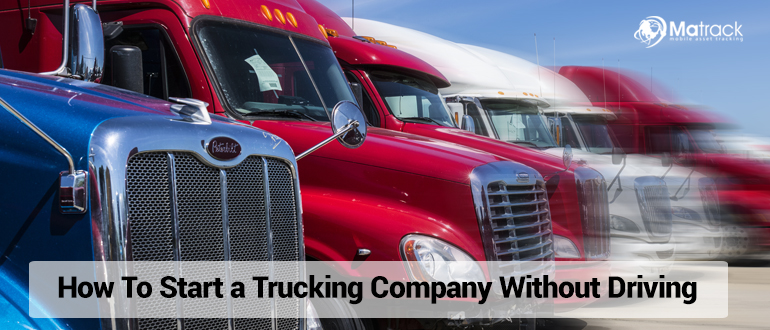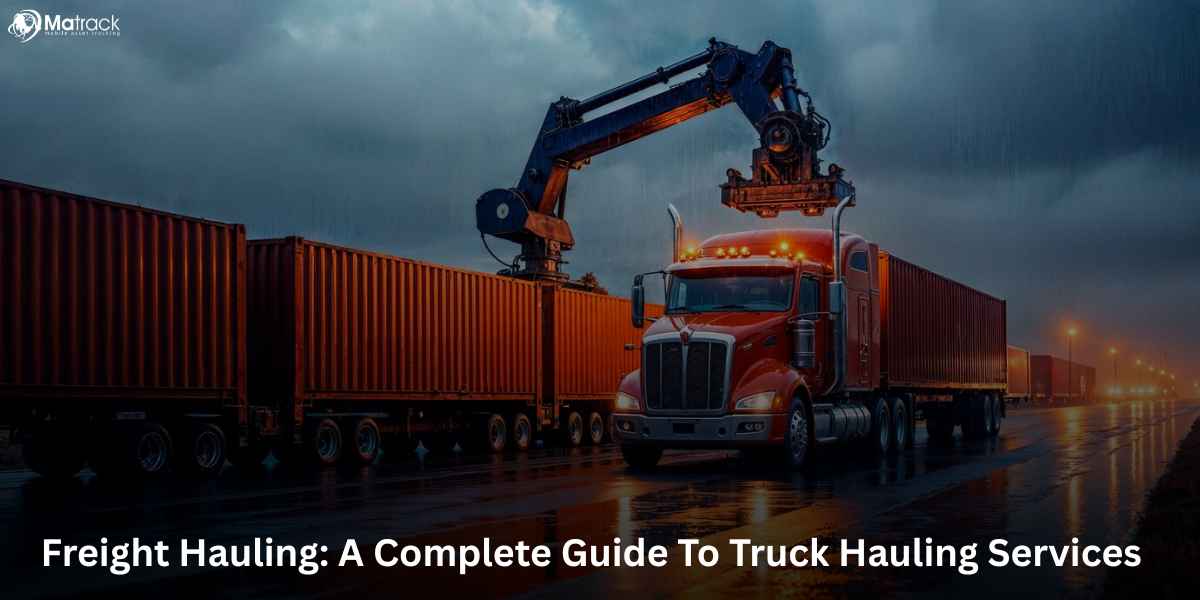Key Takeaways:
- You can start a trucking company without driving by hiring skilled drivers, managing operations, and focusing on business growth.
- You can make money in trucking without driving with high demand, allowing you to start small with one truck and expand over time.
- Legal operation requires permits like DOT numbers, MC authority, IRP tags, and compliance with FMCSA and IFTA regulations.
- Matrack fleet solutions simplify trucking operations with GPS tracking, ELD devices, and efficient fuel and safety management.
Is the Trucking Business Profitable?
The trucking business is important for the country’s economy. In 2021, about 3.5 million truck drivers moved 72% of all freight in the United States, showing how essential trucks are for keeping goods moving.
You can start small with just one truck, which keeps your initial costs low. Over time, you can expand as you get more clients. If you plan well, the trucking business can be a profitable way to grow and succeed.
Many truck drivers eventually start their own companies, using their experience to build a business. With the right tools and strategies, the trucking industry offers great opportunities to thrive.
Can You Run a Trucking Business Without a CDL?
Yes, you can run a trucking company without a Commercial Driver’s License (CDL). Drivers you hire must have a CDL as required by federal rules, but as the owner, you only need a CDL if you plan to drive the truck yourself.
Some owner-operators drive their trucks and run the business, but if you choose not to drive, you can focus fully on managing the company. Hiring skilled drivers allows you to handle business operations and focus on growing your trucking business.
How to start a trucking company without driving?
Create a Business Plan
Create a business plan to lay out your goals, strategies, and how your trucking business will operate. Decide whether you will own trucks, hire drivers, or subcontract work, and determine your target market and services.
Include key details like revenue forecasts, operating costs, and marketing strategies. Breaking your plan into small, actionable steps with timelines will make it easier to track your progress and stay focused.
Discover the Fundamentals of Running a Profitable Trucking Company
Discover the basics of running a successful trucking business by learning about logistics, customer service, and industry regulations. Understand day-to-day tasks like route planning, managing drivers, and keeping trucks in good condition.
Focus on building strong relationships with clients by providing reliable service. Good communication and meeting delivery deadlines will help you retain customers and build a strong reputation.
Understand License and Permit Requirements
Understand the licenses and permits required to operate a trucking company legally. You will need a DOT number, an MC number, and an IRP tag to transport goods across state lines.
These documents prove that your business follows industry rules and safety standards. Meeting these requirements protects your company from penalties and ensures smooth operations.
Get a Commercial Driver’s License (CDL)
Get a Commercial Driver’s License (CDL) for all drivers working in your company. Each state has different testing requirements, so check with your local DMV to understand the process.
Drivers must also know how to perform pre-trip inspections, which are a key part of the CDL test. Providing proper training ensures your drivers meet these standards and improves safety.
Apply for Federal DOT and Motor Authority Numbers
Apply for a Federal DOT number to track your company’s safety records and ensure compliance. The Motor Carrier (MC) number determines what types of goods your company can transport.
You can apply for these through the Federal Motor Carrier Safety Administration (FMCSA). Once approved, these numbers allow you to operate legally as an interstate trucking business.
Complete Your Unified Carrier Registration (UCR)
Complete your Unified Carrier Registration (UCR) to show proof of insurance in every state where your trucks operate. This step is essential for legal compliance.
Make sure your insurance is active and meets all state requirements. Keeping your UCR up to date will help you avoid fines or disruptions to your operations.
Get an International Registration Plan (IRP) Tag
Get an International Registration Plan (IRP) tag for each truck in your fleet. This tag allows your trucks to operate in all U.S. states and most Canadian provinces.
You can apply for the IRP tag through your home state’s transportation office. This ensures your business follows road use regulations when crossing state lines.
Understand Heavy Use Tax Regulations
Understand that trucks weighing over 55,000 pounds are subject to heavy highway use tax. This tax is required every year and helps maintain the country’s highways.
Make sure to file your taxes on time to avoid penalties. Consider working with a tax professional to simplify the process and ensure accuracy.
Obtain an IFTA Decal
Obtain an International Fuel Tax Agreement (IFTA) decal for trucks operating across states. This decal simplifies fuel tax reporting for interstate travel.
Keep accurate fuel usage records to make the IFTA reporting process easier. Filing on time prevents penalties and keeps your business in compliance.
File a BOC-3 Form
File a BOC-3 form to designate a process agent for handling legal documents. This is a required step to operate your trucking company legally.
You can register your BOC-3 form with the FMCSA. This ensures your business is compliant with federal regulations for interstate commerce.
Get Business Insurance
Get the necessary business insurance to protect your company from risks. You need liability, cargo, bobtail, and physical damage insurance.
Consult with an insurance agent familiar with the trucking industry to make sure you have the right coverage. Proper insurance will protect your drivers, trucks, and businesses from unexpected costs.
Purchase Your First Truck
Purchase your first truck as one of your biggest investments. Decide whether to buy or lease based on your budget and long-term goals.
Owning a truck eliminates regular payments, while leasing gives you flexibility. Choose a reliable, fuel-efficient model to reduce maintenance and fuel costs.
Track Fleet and Finances
Track your fleet and finances to keep your business running smoothly. Use fleet management tools to monitor routes, driver performance, and vehicle maintenance.
Stay on top of your cash flow by keeping accurate records of expenses and revenue. Consider hiring a bookkeeper or using accounting software to manage payroll and invoices.
Use Technology to Simplify Operations
Use technology to simplify your trucking business operations. Electronic logging devices (ELDs) help track driving hours and ensure compliance with federal regulations.
Automated tools for invoicing, route planning, and customer communication save time and reduce errors. Investing in technology will improve efficiency and make it easier to scale your business.
Matrack Fleet Management Solutions for New Trucking Businesses
Matrack Fleet Management Solutions helps trucking companies manage operations, reduce costs, and improve efficiency. With its fleet management system and FMCSA-compliant ELDs (Electronic Logging Devices), Matrack makes it easier to handle compliance, track vehicles, and optimize routes.
Key Features of Matrack
1. FMCSA and DoT Compliance
Matrack ELDs meet FMCSA and Department of Transportation rules for recording hours of service (HoS). This ensures you stay compliant and avoid costly violations.
2. GPS Fleet Tracking and Mapping
Matrack fleet tracker provides real-time GPS tracking to monitor vehicles and traffic conditions. This helps drivers find the best routes and ensures deliveries are on time.
3. Fuel and Maintenance Management
Track fuel usage and schedule regular vehicle maintenance easily with Matrack. These features help reduce fuel costs, avoid breakdowns, and keep your fleet running smoothly. Check out Matrack’s fleet fuel card.
4. Accurate, Tamper-Proof Data
Matrack ELDs record data automatically and cannot be tampered with. Drivers can log their hours quickly through the app, eliminating paper logs and ensuring compliance with inspections. Buy Matrack ELD device.
5. IFTA Tax Reporting
The system simplifies IFTA tax calculations by automatically collecting and analyzing data. Reports are generated quickly, saving time and reducing errors.
6. Easy Installation and Accessibility
Matrack devices are simple to install and can be accessed from a desktop, phone, or tablet. The app is user-friendly and allows you to manage your fleet from anywhere.
7. Safety Monitoring
Monitor driver behavior, such as speeding and harsh braking, to improve safety. Matrack also provides detailed reports to help manage risks and ensure compliance.






